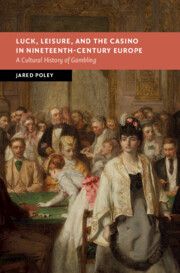Book contents
- Luck, Leisure, and the Casino in Nineteenth-Century Europe
- New Studies in European History
- Luck, Leisure, and the Casino in Nineteenth-Century Europe
- Copyright page
- Dedication
- Contents
- Figures
- Acknowledgments
- Introduction
- Chapter 1 Gambling in the Nineteenth Century
- Chapter 2 Visiting the Resort
- Chapter 3 Experiencing the Casino
- Chapter 4 Probability and the Casino
- Chapter 5 Chance and Luck
- Chapter 6 Gambling and the Body
- Chapter 7 Gambling and the History of Emotions
- Chapter 8 The Psychology of Gambling
- Chapter 9 What Gambling Was
- Conclusion
- Bibliography
- Index
Chapter 3 - Experiencing the Casino
Published online by Cambridge University Press: 24 August 2023
- Luck, Leisure, and the Casino in Nineteenth-Century Europe
- New Studies in European History
- Luck, Leisure, and the Casino in Nineteenth-Century Europe
- Copyright page
- Dedication
- Contents
- Figures
- Acknowledgments
- Introduction
- Chapter 1 Gambling in the Nineteenth Century
- Chapter 2 Visiting the Resort
- Chapter 3 Experiencing the Casino
- Chapter 4 Probability and the Casino
- Chapter 5 Chance and Luck
- Chapter 6 Gambling and the Body
- Chapter 7 Gambling and the History of Emotions
- Chapter 8 The Psychology of Gambling
- Chapter 9 What Gambling Was
- Conclusion
- Bibliography
- Index
Summary
Visitors to resorts were enveloped in a new world that had the casino and its pleasures at its core. The novel forms that the institution assumed in the nineteenth century represent a change in the structure as a whole. The casino did important cultural work in the imaginations of nineteenth-century observers, recalling other social spaces, from the court to the church, and offered a contrast to other locations associated with nineteenth-century modernity. The architectural elements that were not directly related to gambling had the subsidiary purpose of keeping people within the physical confines of the building so that they would return to the gambling tables. Nineteenth-century casinos were anchored in attempts to generate and encourage certain forms of middle-class sociability. The casino produced an environment in which the emotions were unmoored, and new sensations attacked any previous emotional core that visitors possessed. Unlike other spaces that channeled emotion – the cathedral or the court – the nineteenth-century casino did so in the service of play, pleasure, and financial gain.
Keywords
- Type
- Chapter
- Information
- Luck, Leisure, and the Casino in Nineteenth-Century EuropeA Cultural History of Gambling, pp. 47 - 88Publisher: Cambridge University PressPrint publication year: 2023

